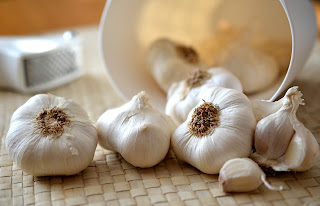Garlic is a most popular herb that has been used for both culinary and medicinal purposes for centuries. garlic is a healthy and flavorful addition to many dishes, and its potential health benefits make it a worthwhile ingredient to include in your diet.
Here are some essential benefits of consuming garlic:
- Boosts Immunity: Garlic contains antioxidants that can help boost your immune system, reducing the risk of infections, such as the common cold.
- Lowers blood pressure: Garlic eating has been shown to help reduce blood pressure levels in some people, which can reduce the risk of heart disease.
- Lowers cholesterol: Some studies suggest that consuming garlic may help reduce LDL cholesterol levels in the blood, which can lower the risk of heart disease.
- May improve brain function: Garlic contains compounds that can help improve brain function and may help protect against age-related cognitive decline.
- May have anticancer properties: Some studies suggest that garlic may have anticancer properties, although more research is needed to confirm this.
- Supports digestion: Garlic eating has been traditionally used to support digestion and treat gastrointestinal issues such as dyspepsia, bloating, and gas. It contains prebiotics that feed the beneficial gut bacteria, promoting a healthy gut microbiome.
- May improve athletic performance: Some studies suggest that garlic supplements may improve exercise performance by reducing fatigue and increasing endurance.
- May help with weight loss: Garlic contains compounds that may help regulate metabolism, reduce appetite, and increase fat burning, making it a potentially useful aid in weight loss.
- May have anti-diabetic effects: Garlic may help regulate blood sugar levels in people with diabetes by increasing insulin sensitivity and reducing insulin resistance.
- May have anti-aging properties: Garlic is rich in antioxidants, which help neutralize harmful free radicals in the body and protect against oxidative stress, a key factor in the aging process.
- May help with skin and hair health: Garlic contains compounds that may help promote skin and hair health by improving circulation and reducing inflammation.
- May improve bone health: Garlic contains nutrients such as calcium, magnesium, and vitamin D, which are important for maintaining strong and healthy bones. Some studies suggest that garlic eating may help prevent osteoporosis, a condition characterized by weakened bones.
- May improve respiratory health: Garlic has been traditionally used to treat respiratory infections and asthma. It contains compounds that may help relieve congestion and reduce inflammation in the respiratory system.
- May have anti-viral properties: Garlic contains compounds that have been shown to have antiviral properties, making it a potentially useful ingredient in the prevention and treatment of viral infections.
- May improve cardiovascular health: Garlic has been shown to have a range of cardiovascular benefits, including reducing the risk of atherosclerosis (hardening of the arteries), improving blood flow, and reducing the risk of blood clots.
- May improve liver health: Garlic contains compounds that may help protect the liver from damage caused by toxins and oxidative stress.
- May help reduce the risk of cancer: Some studies suggest that garlic eating may help reduce the risk of certain types of cancer, including colon, stomach, and prostate cancer..
- Boosts immune system: Garlic has been shown to enhance the function of the immune system, helping to protect against illness and infection.
- Lowers blood pressure: Studies suggest that garlic may help to reduce blood pressure in people with hypertension.
- Reduces inflammation: Garlic contains compounds that have anti-inflammatory properties, which may help to reduce inflammation throughout the body.
- Improves cholesterol levels: Garlic may help to lower levels of LDL (bad) cholesterol and increase levels of HDL (good) cholesterol, which can reduce the risk of heart disease.
- Anti-cancer properties: Garlic has been shown to have anti-cancer properties, potentially helping to prevent or slow the growth of cancer cells.
- Promotes healthy digestion: Garlic has been used traditionally to aid digestion and may help to promote the growth of healthy gut bacteria.
- Natural antibiotic: Garlic contains compounds that have natural antibiotic properties, which may help to fight off bacterial and viral infections.
- May improve brain function: Some studies suggest that garlic may have a positive effect on cognitive function, memory, and learning.
- Helps to regulate blood sugar: Garlic may help to regulate blood sugar levels by improving insulin sensitivity and reducing insulin resistance.
- May improve bone health: Some research suggests that garlic may help to improve bone health by increasing bone density and reducing the risk of osteoporosis.
- Fights against respiratory infections: Garlic has been used for centuries to treat respiratory infections such as colds, flu, and bronchitis due to its antibacterial and antiviral properties.
- May improve athletic performance: Garlic may help to improve athletic performance by reducing fatigue and increasing endurance.
- May improve skin health: Garlic contains antioxidants that may help to protect the skin from damage caused by free radicals, potentially helping to improve the appearance of the skin.
- May improve sexual health: Some studies suggest that garlic may have aphrodisiac properties and may help to improve sexual function in men.
It's important to note that while garlic eating has many potential health benefits, it is not a substitute for medical treatment or a balanced diet and lifestyle. If you have any concerns about your health, it's always best to consult with a healthcare professionals.
Garlic is a versatile and flavorful herb that is used in many cuisines around the world. In addition to its culinary uses, garlic has been used for medicinal purposes for centuries, and there is a growing body of scientific research to support many of its health benefits.
Overall, garlic eating is a healthy addition to your diet, and its potential health benefits make it a worthwhile ingredient to include in your meals.








